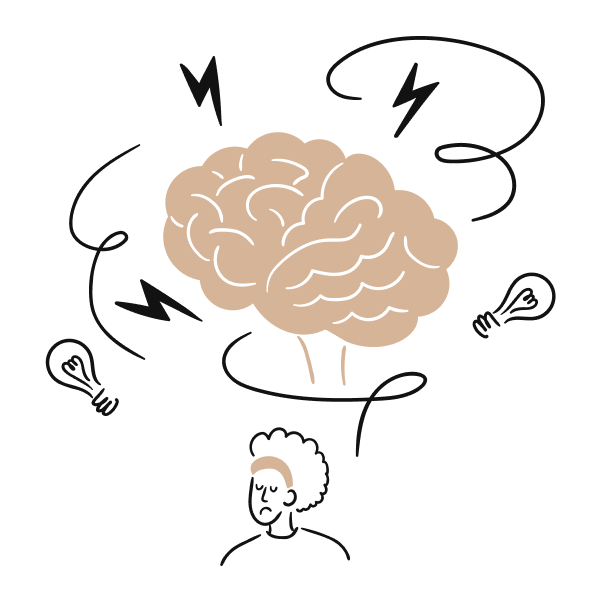In short
- With a compulsive disorder, you constantly believe that you must do certain actions;
- Compulsive acts come from compulsive thoughts;
- You believe that otherwise something serious will happen. These compulsive thoughts and actions can interfere with your daily life;
- Compulsive thoughts and actions are time consuming and also deplete your energy.
What is a compulsive disorder?
What are the symptoms of a compulsive disorder?
- Feeling the urge to want to organize everything perfectly. Many aspects of your life you want to organize to perfection. If you don’t do this, you become very insecure.
- Not being able to enjoy your daily life carefree. You constantly worry about all kinds of anxious thoughts.
It is a compulsive disorder when the following symptoms occur:
- You suffer daily from compulsive thoughts and/or compulsions;
- You constantly feel that not following the compulsions will lead to unpleasant consequences;
- Failure to perform the actions also causes anxiety and distress;
- You see your thoughts as the truth; You can’t let go or ignore these thoughts;
- You become anxious about your thoughts;
- Your thoughts persist and are forced upon you;
Examples of compulsive thoughts (intrusions)
- Thoughts of a sexual nature, such as the thought that you may be same-sex, or fretting or dissatisfaction about your gender. Or about sexual things that are considered inappropriate: for example, sex with animals, family members or children.
- Thoughts of an aggressive nature, such as the thought that you might harm others without wanting to.
- Thoughts about health, such as the thought that you will be infected with a serious disease or that you will infect others.
Compulsive acts
In a compulsive disorder you often suffer from compulsive acts, in addition to compulsive thoughts. Compulsive acts come from the compulsive thoughts. You think that something bad will happen the moment you fail to do an action. In the short term, these actions offer you reassurance, but they cost a lot of energy.
Examples of compulsions (compulsions)
- For example, you re-lock the door 10 times to avoid being burglarized.
- Washing your hands exceptionally often to avoid getting sick.
- Checking the gas stove several times before you leave home to prevent a fire.
- Looking in the mirror extremely often to see if you still look good.
- Wanting to always put on your socks, shoes, pants and shirt in the same order to avoid having an accident.
Types of compulsive disorders
We know five types of compulsive disorders.
- Obsessive-compulsive disorder
If you have an obsessive-compulsive disorder (OCD), you suffer from compulsive thoughts several times a day. With or without compulsions. Contamination is an example of OCD. You have extreme fear of contracting an illness or spreading germs. - Hoarding disorder
In a hoarding disorder, you have an urge to collect and keep specific items. Getting rid of stuff is particularly difficult for you. It often leads to you having a large amount of stuff in your home while there is not enough space. - Skin Pulling Disorder (Excoriation Disorder)
If you suffer from excoriation disorder, you have the urge to pick at your skin. You can’t stop picking and you damage the skin. - Body dysmorphic disorder
If you have Body dysmorphic disorder, you feel that you have a deformity about your body or face. Often no or hardly any abnormality is visible to others. You pay extreme attention to it and think that you’re ugly. You want to camouflage your face, for example, or in extreme cases plastic surgery to fix the “abnormality”. - Trichotillomania (Hair Pulling Disorder)
With trichotillomania, you experience an urge to pull out your own hair. Not only the hair on your head, but also eyelashes, eyebrows or other forms of body hair.
What causes a compulsive disorder?
There are several factors that can contribute to the development of a compulsive disorder, including: genetics, environment and personal circumstances.
- Genetics
If one of your parents has a compulsive disorder, you are more likely to develop a compulsive disorder as well. This does not directly mean that you will actually suffer from it. - Your character
If you have a compulsive disorder, you are sensitive to negative consequences, easily stressed, perfectionist, introverted, more anxious and you need control and certainty. You can also overestimate things quickly and may have a high sense of responsibility. - Life events
Sometimes a compulsive disorder develops after experiencing major, stressful life events. For example, going through a divorce or becoming unemployed. You are then more susceptible to developing a compulsive disorder.
How does a compulsive disorder affect your daily life?
- It lowers your energy level because you are constantly engaged in compulsive thoughts in your head and performing compulsive acts in daily life.
- It lowers your productivity and interrupts routine because compulsive thoughts distract you from what really matters. Your everyday routine is interrupted and this comes at the expense of your productivity.
- You have difficulty with social relationships and interactions because you may feel ashamed of your symptoms, or others may not understand you well. You may rarely participate in social activities because of all the mandatory actions.
What can you do for yourself?
Tips for myself – I am experiencing a compulsive disorder
Are you experiencing symptoms of a compulsive disorder? There are several things you can try with or without the help of a psychologist:
- Read about compulsive disorders. This will help you learn more about your own symptoms and understand them better;
- Talk about your compulsive thoughts and associated symptoms with the people around you. You may know someone who recognizes your symptoms or find support from another person;
- Take good care of yourself. Exercise enough; keep a regular sleep schedule; get enough rest and relaxation and eat healthy. An unhealthy lifestyle can make your symptoms worse.
Tips for my loved ones – and me
The following advice is for partners, friends of someone with a compulsive disorder.
- Read about a compulsive disorder. It helps in understanding your loved one’s compulsive thoughts and symptoms.
- Reassure the person with compulsive thoughts or offer your loved one some form of relaxation.
- Don’t go along with the compulsion, but don’t judge the other person for it either. Recognize that the other person actually feels that he or she has to perform compulsions.
- Stay mindful of your own limits if you want to help someone with compulsions. You can only help the other person if you are calm yourself.
Compulsive disorder treatment
Therapy forms of compulsive disorder at iPractice
- Testing and challenging compulsive thoughts;
- Distancing yourself from your compulsive thoughts;
- Not do the compulsions anymore.
We briefly explain each therapy and its underlying purpose:
- Cognitive behavioral therapy (CBT)
Together with the psychologist, you will test and challenge your compulsive thoughts. For example, with a probability test. You also look together at what the compulsions bring you, versus what it costs you on the long term. This makes you aware of your thinking process. - Acceptance and Commitment Therapy (ACT)
In ACT, you work with the psychologist to create distance from your compulsive thoughts. You learn that your thoughts are just thoughts, which don’t always have to be true. And you learn that you don’t have to act on these compulsive thoughts. - Exposure & Response Prevention
In exposure therapy, you are exposed to fearful thoughts and situations that trigger anxiety. You experience that your fear is unfounded and the tension decreases. With Response Prevention, you consciously train yourself not to do the compulsions. The connection between compulsions and compulsive thoughts disappears and the anxiety extinguishes.
Help with a compulsive disorder
Do you have questions about a compulsive disorder? Or do you have doubts about when to consult a psychologist?
-
Have you tried many things yourself and still experiencing symptoms? Feel free to call us at 085-1308900 or contact us online. This way you can feel if there is a connection and if you feel comfortable.
-
At iPractice, you will work with 2 psychologists. Treatment consists of both online contact and regular consultation room sessions at one of iPractice’s locations. Or find more information about the intake and treatment process at iPractice.
-
Cognitive behavioral therapy and Exposure/Response Prevention, sometimes combined with ACT, are common therapies for compulsive disorder. Treatment at iPractice lasts 3 to 12 sessions, on average.
-
With a referral letter from the general practitioner and an official diagnosis of a compulsive disorder according to DSM-5 guidelines, almost every insurer will reimburse the cost. See which health insurance companies reimburse our care.
-
Read the personal story of Maria about her anxiety disorder and how treatment at iPractice has helped her to recover. Or read all personal stories about anxiety disorders.
FAQ
There is evidence that compulsive disorders run in families. This does not mean that you will necessarily develop an compulsive disorder as well, but it does mean that it is more likely.
A compulsive disorder does not cause immediate danger. However, it can cause you to take less care of yourself, and it can seriously affect your daily life. Consider someone who compulsively washes hands, causing the skin to lose its protective layer. You can literally wash your hands to death. Or your skin damaged by compulsively pulling out your hair.


 Nederlands
Nederlands




